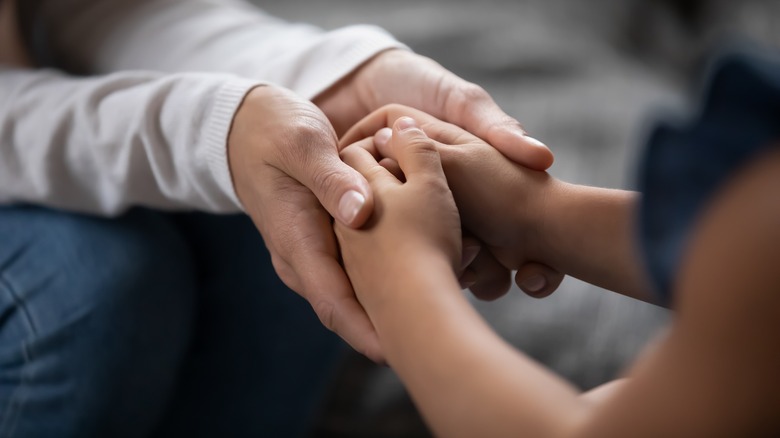Can A Good Fight Be Just What Your Relationship Needs?
Fighting with your partner is widely acknowledged as part and parcel of long-term relationships, and never fighting may even be a sign that you're too comfortable in your relationship. As marriage and family therapist Kiaundra Jackson told Oprah Daily, "If a couple told me they never fight, then I would be worried."
Besides fights, there are other terms that can describe the negotiations that happen in relationships: words like discussions, arguments, and debates all de-center winning and losing, and prioritize finding a solution for all. As clinical psychologist Abby Medcalf told Well & Good, "I dislike using the word 'fight' because as soon as you hear that term, you think of two boxers in a ring, and you know that someone's going to win and someone's going to lose." She continued, "You don't want to lose, so you immediately become more adversarial than you need to be because you want to win and you want them to lose."
There is plenty of advice out there about fighting "well," and what you should and shouldn't do after a fight with your partner, since taking time to come back together after a disagreement can mean reconciliation, as well as long-term healing. In analyzing how couples fight, relationship experts can see signs of whether couples can go the distance, while providing strategies to help us all work toward better connections with our partners.
Avoiding fights is a misstep
Is there such a thing as fighting too often or too little? Clinical psychologist Joseph Cilona shared with Glamour, "There is no one correct formula when it comes to frequency of conflict, and there is no one correct way to navigate conflict that's right for all couples." However, there are techniques that can foster a more supportive dynamic between you and your partner when disagreements arise. Approaching issues with apathy, or refusing to disengage is the first major no-go for successful conflict. Another clinical psychologist Ramani Durvasula shared with the outlet, "When couples fight, it means they care about the relationship. When fighting goes away completely, sometimes one or both people have checked out."
Ultimately, avoidance is a major threat to a relationship's overall health, and may be a sign that partners need to reevaluate their attachment styles and how childhood patterns affect their lives. "When people avoid 'fighting,' they avoid talking," Jim McNulty, a professor of psychology at Florida State University, told CNN. "I'm constantly telling my partner, 'If something's bothering you. I'd rather know it than not know it so that I can maybe do something about it." In addition, if we don't bring up what's been bothering us, it has a way of coming out through our interactions with our partners. Instead, the goal is to broach conflict without giving into our wounded selves.
Active listening is crucial for productive fights
Finding language that places your needs at the center of the conflict is the best technique for resolving a "good fight," according to relationship experts. "Below every single conflict, there's an unmet emotional need," relationship coach Steven Dziedzic told Oprah Daily. One way to move toward healthier conflict is to avoid "you" statements directed at your partner, and instead reflect on your own needs and feelings. Individual and couples therapist Caitlin Cantor told CNN, "There's a lot of difference between saying, 'You're doing this,' or 'You are this,' versus 'I feel like this when you do this.'" She explained, "Using the phrase 'I feel ...' is much less triggering."
Another way you can have the good fight your relationship needs is paraphrasing what your partner has said, and asking for clarification when you need it, according to psychology professor Jim McNulty. "When you catch your breath and ask for clarification, you'll be surprised how often you'll hear, 'No, I really meant this instead,' " McNulty said. Once you have strong strategies to bring a problem to your partner, you will also be better equipped to receive their expressions of unmet needs. As couples therapist Tracy Ross told Well & Good, "Discord or disagreement is often the vehicle for growth." She added, "While you can't change another person, you can grow together with someone by shifting to accommodate their needs—and doing so strengthens the individuals as well as the relationship."


